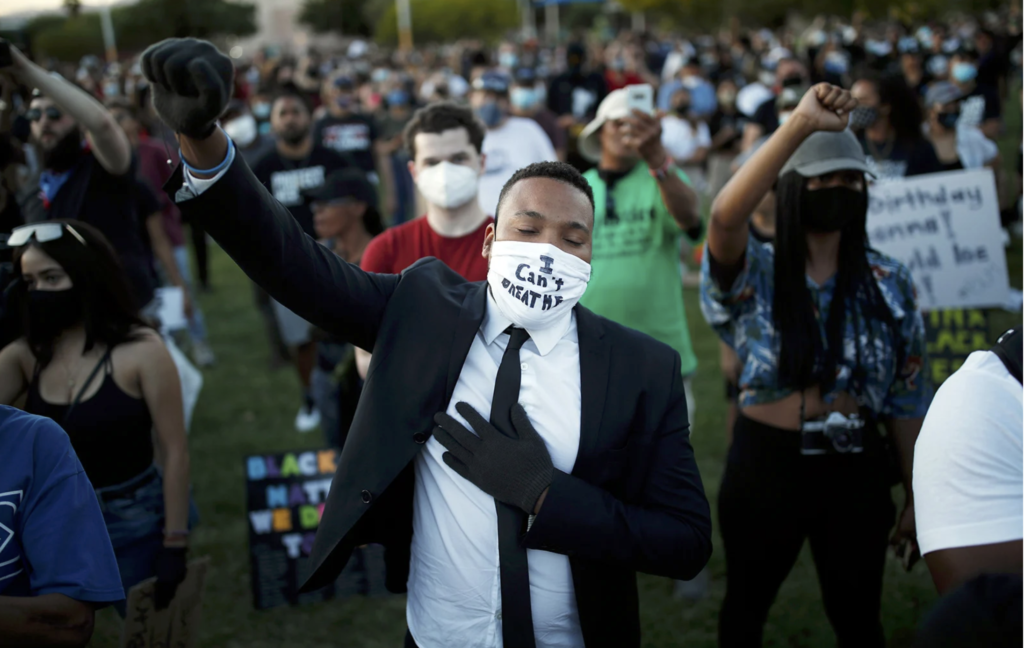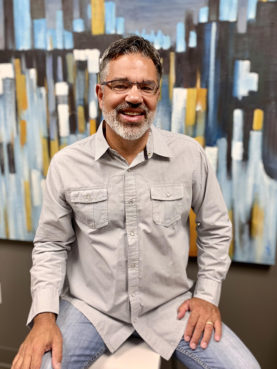
People raise their fists during a rally, Friday, June 5, 2020, in Las Vegas, against police brutality sparked by the death of George Floyd, a black man who died after being restrained by Minneapolis police officers on May 25. (AP Photo/John Locher)
For decades, “racial reconciliation” has been the language many white evangelical Christians used when they talked about cultivating improved race relations. “Racial justice” — the term often heard in recent months in the wake of the deaths of George Floyd and other Black people in police custody, was avoided.
When it comes to multiracial evangelical churches, a recent study finds, the use of the two approaches has been particularly evident of a divide between catering to the comfort of white congregants and answering the calls of Black people and others to remedy racial injustices.
Michelle Oyakawa, a visiting assistant professor of sociology at Kenyon College in Ohio, studied the responses of dozens of evangelical leaders of racially and ethnically diverse congregations in the U.S. to the two “racial frames” and found that using racial reconciliation is a “middle route.” It does not favor segregation but also does not advocate for civil rights, thus downplaying religious divisions that many people of color in multiracial congregations want to see confronted, she said.
Oyakawa wrote a paper based on findings from 121 in-depth interviews with pastors of multiracial churches for the Religious Leadership and Diversity Project, led by sociologist Korie Edwards at Ohio State University. Of those, Oyakawa said, 54 were evangelical, and “the overwhelming majority” chose the frame of “racial reconciliation” instead of “racial justice.”
As an example of how talking of reconciliation can frustrate progress on racial issues, Oyakawa, who is Japanese American, cited a white clergyman who visited Ferguson, Missouri, after the death of Michael Brown, a young Black man shot by a white police officer in 2014. In an interview, the clergyman said the gospel is “bigger than politics” but he spoke of the struggles of leaders of multiracial churches when they strive to be neutral.
“So we have to address (Brown’s killing) with the humility of Gospel and lead the way without picking one side or the other, but holding both sides together for conversation and movement beyond where we’re at,” he said. “And it’s a very difficult thing.”
Oyakawa, a former research assistant with the Religious Leadership and Diversity Project, said, “It might be hard for people to truly come together across race when these racial inequalities exist and aren’t being addressed.”

Mark DeYmaz. Courtesy photo
Stewart said he remains dissatisfied with the growing discussions since the death of George Floyd in Minneapolis under a white officer’s knee.
“The conversations are centered simply on conversations,” said Stewart, now a graduate student at Emory University’s Candler School of Theology, and a minister at an Augusta, Georgia, congregation affiliated with the Progressive National Baptist Convention, a historically Black denomination. “The conversations don’t deal with the given system of injustice that we’re trying to live in, and not simply try to live in, but also trying to be Christian in.”
The official statements from white evangelical churches or multiracial churches and Twitter hashtags in recent months, he said, only go so far. “Public proclamations without public change is public performance,” said Stewart. “So people can say, ‘Black lives matter’ but then in the same breath they can say one of these fundamental organizations that are fighting for Black lives to matter in society — they say that ‘I don’t agree with the organization.’”
After the recent deaths of Floyd, Ahmaud Arbery in Georgia, Breonna Taylor in Kentucky and others, DeYmaz said that more predominantly white churches and some multiracial churches are looking to foster cross-cultural relationships within their congregations that go beyond talk.
“They want to move beyond the racial reconciliation; they want to begin to think about structural shift,” he said. “They’re coming to recognize justice is not peripheral, but intrinsic to the gospel.”
Ahead of the Trend is a collaborative effort between Religion News Service and the Association of Religion Data Archives made possible through the support of the John Templeton Foundation.
Mark DeYmaz, co-founder and president of Mosaix Global Network, said part of the problem is that many evangelical multiracial churches may look diverse in the pews, but are dominated by white staff and a white viewpoint.
“If you’re in a church of 2,000 people and it’s evangelical and you looked out on the crowd and 30% of people are nonwhite, but your whole staff is essentially white, the way you lead worship is white,” said DeYmaz, whose organization offers support and training for multiracial churches. “The structures and the systems of your church are what we might call a white church.”
Since 1998, recent data shows, evangelical multiracial congregations rose from 7% to 23%.
In the years after the 2012 death of Trayvon Martin and the start of the Black Lives Movement, Danté Stewart, a Black writer and speaker, often acted as a volunteer consultant to the predominantly white evangelical churches where he attended. Pastors and other leaders sought his advice on racial issues, or how to become more multicultural. He eventually grew tired, Stewart said, of their emphasis on “unity talk” about racial reconciliation instead of “seeing black people as full citizens.”
